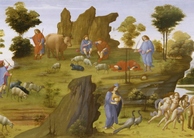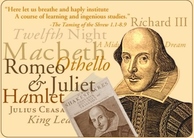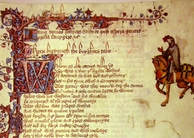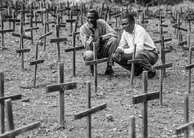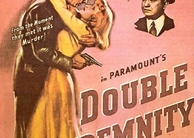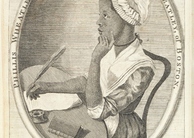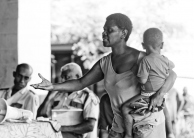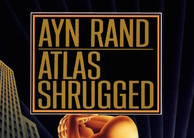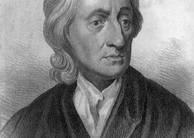|
2009 Volume 1 Issue 12
2009, Vol. 1 No. 12
The number of ancient sources available to the readers and playwrights of Elizabethan times was truly immeasurable. These sources could be reached both as original texts in Greek and Latin, and in French and English translations. Popular indirect... Read Article »
2009, Vol. 1 No. 12
A giant hole is ripped in the side of a skyscraper. Smoke and flames pour out and debris tumbles into the street. Clouds of smoke billow upwards and burning embers rain down. Plumes of dust and smoke blot out the sun, darkening the city skyline.... Read Article »
2009, Vol. 1 No. 12
Two seemingly unconnected goddesses have more in common than most know. The earth is a small place and mythologies from one country overlap and even overtake myths from another country. Serpents in myth have an amazing connection, especially... Read Article »
2009, Vol. 1 No. 12
More than half a century ago, famed philosopher George Santayana observed, “Those who cannot remember the past are condemned to repeat it.” In the 20th century alone, the world bore witness to the Holocaust in Europe, as well as genocide... Read Article »
2009, Vol. 1 No. 12
An actor is on stage. He begins to speak, and as he does so the hearts of the audience wrench. The actor is pronouncing his love to a woman through song; or he is swearing revenge against the man who killed his father; or he is staring at the back... Read Article »
2009, Vol. 1 No. 12
Author Susan Bordo has said, “fat is the devil, and we are continually beating him” (48). When considering this statement, and others like it, it is important to consider the ways in which we are also turning that devil around, giving... Read Article »
2009, Vol. 1 No. 12
Homework continues to be a controversial topic. The debate over homework is an old one, with attitudes shifting throughout the debate over the years. Proponents and opponents make cases to support their views on the necessity and importance of homework... Read Article »
2009, Vol. 1 No. 12
A great deal is known about Nikola Tesla’s origins—namely, his country and people, to which and of whom he attributed so great a deal. The inventor recognized that he came from an extremely conflicted area in the Balkans, full of strife... Read Article »
2009, Vol. 1 No. 12
The French historian Jean de Joinville was born into a noble and influential family in Champagne in 1224.[1] He took the cross in 1248 to join the first crusade of Louis IX. His decision to go on crusade was at least in part influenced by the long... Read Article »
2009, Vol. 1 No. 12
William Shakespeare wrote these lines, but his use of the mythological tradition of otherworldly appearances in his plays is anything but insubstantial. Sometimes he crafted them as a permeating presence, other times passing rather quickly, but... Read Article »
2009, Vol. 1 No. 12
Chaucer’s description of “the Knight” in his “General Prologue” may be seen as a multi-layered narration. First he gives a very precise and historically relevant account of his campaigns. Based on what Chaucer knows... Read Article »
2009, Vol. 1 No. 12
Written language is one of the greatest human accomplishments; its formation signifies a breakthrough in human progress. The development of a standardized writing system seems to be a somewhat natural occurrence in the evolution of any given advanced... Read Article »
2009, Vol. 1 No. 12
Hypothyroidism is an unsuspected illness of epidemic proportions in western civilization unrecognized by the modern medical community (Starr xix). The affects are far-reaching and pervasive. The purpose of this research is to demonstrate that addressing... Read Article »
2009, Vol. 1 No. 12
Art Nouveau is the so-called “modern style” developed at the turn of the 19th century. Although it is dated roughly between 1890 and 1910, its first true recognition as an important new movement in art and design occurred at the Universal... Read Article »
2009, Vol. 1 No. 12
“The genocide was a collective act. What made it possible, what made that final political crime possible was the absence, the erasure of seeing the other, of knowing, of feeling, of being with the other. And when that's removed, then politics... Read Article »
2009, Vol. 1 No. 12
In her article “Visual Pleasure and the Narrative Cinema”, Laura Mulvey describes a way of analyzing and understanding cinema from a feminist and psychoanalytic perspective. A very similar approach is taken by Molly Haskell in her review... Read Article »
2009, Vol. 1 No. 12
In Enhancing the Recall of Presented Material, Larson (2009) examined the effects of different styles of note-taking and which ones seemed to benefit undergraduates when tested on the material they were expected to know. This study specifically... Read Article »
2009, Vol. 1 No. 12
Film critic Andre Bazin had very strong feelings on the subject of montage and realism. In his article “The Evolution of the Language of Cinema”, he explains his theory that montage, although necessary in many cases to make a film work... Read Article »
2009, Vol. 1 No. 12
It is mid-1998. On news programs in the United States, the issue of intervention in Kosovo is addressed as a prevalent concern. It is at least mentioned in every presentation: any progress that's been made or any possible change is offered to the... Read Article »
2009, Vol. 1 No. 12
Children’s literature in the context of this research paper (and hopefully too in the eyes of the majority) is the ultimate escape; it is neither box nor leash nor constraint of any sort. It is the one genre of literature that does not hold... Read Article »
2009, Vol. 1 No. 12
When considering historical literature that is based upon people who once lived, readers often ask where the details are taken directly from historical accounts, and where they differ. This is a perfectly valid lens through which to view the work... Read Article »
2009, Vol. 1 No. 12
What critical evolutionary events does the span of human progression include? Anthropologists agree that decisive transitions such as sedentism, domestication, the use of language, and the arrival of culture and complex societies are associated... Read Article »
2009, Vol. 1 No. 12
The autobiography Black Boy, by Richard Wright, is a tale of hope and determination. It catalogues Wright’s life growing up as an African-American in Jim Crow South, depicting the economic and social struggles that were stereotypical for African... Read Article »
2009, Vol. 1 No. 12
Nationalism is defined by Merriam-Webster’s dictionary as, “loyalty and devotion to a nation; especially: a sense of national consciousness exalting one nation above all others and placing primary emphasis on promotion of its culture... Read Article »
2009, Vol. 1 No. 12
I will oppose fervently anyone who argues that the relative success of the Christian church owes anything to “uniqueness,” at least as far as theology goes. Christianity is not unique, not in its conception of God, not in its ideas about... Read Article »
2009, Vol. 1 No. 12
Atlas Shrugged’s presentation of money departs from the traditional dichotomy of the “haves and have-nots.” In fact such a characterization of money succinctly captures the ultimate evil, in conflict with the ultimate good. The... Read Article »
2009, Vol. 1 No. 12
The prevalence of methamphetamine (ME) use among American Indians and Native Alaskans (AI/NAs) is strikingly high in comparison to other ethnic groups in the U.S. (Iritani, Dion Hallfors & Bauer, 2007). However, few datasets are available that... Read Article »
2009, Vol. 1 No. 12
In Book II of “The House of Fame,” the narrator states that his dream is of greater significance than the biblical visions of “Isaye,…kyng Nabugodonosor, [and] Pharoa” (514-5). Beginning with line 480, “The House... Read Article »
2009, Vol. 1 No. 12
Political philosopher and social psychologist, John Locke was an outspoken supporter of equal rights within a governed society. He espoused the natural rights of man, namely the right to life, liberty and property, and he articulated that every... Read Article »
2009, Vol. 1 No. 12
In Robert Frost’s “Stopping by Woods on a Snowy Evening,” the motive behind the narrator’s “stopping” has long been debated (3). On one side, some argue that the narrator is simply looking over the scenery. On... Read Article »
Issue Archives
2026 - Volume 18
2025 - Volume 17
2024 - Volume 16
2023 - Volume 15
2022 - Volume 14
2021 - Volume 13
2020 - Volume 12
2019 - Volume 11
2018 - Volume 10
2017 - Volume 9
2016 - Volume 8
2015 - Volume 7
2014 - Volume 6
2013 - Volume 5
2012 - Volume 4
2011 - Volume 3
2010 - Volume 2
2009 - Volume 1
|

